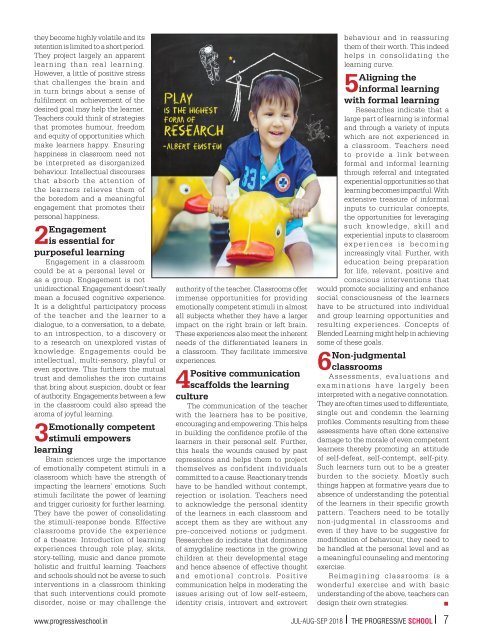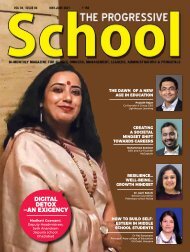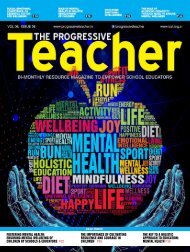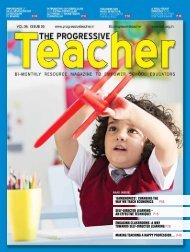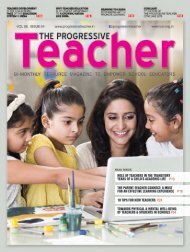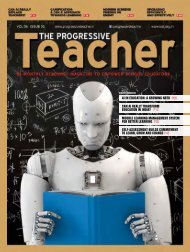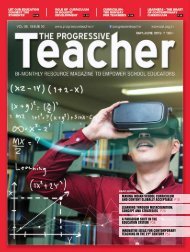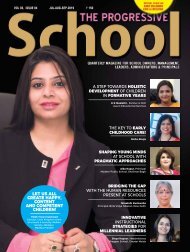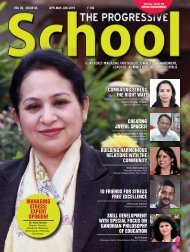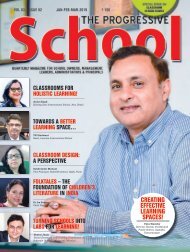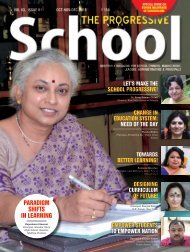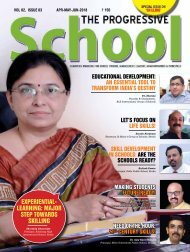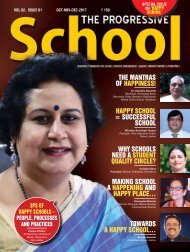The Progressive School Vol 02 Issue 04
The Progressive School is a quarterly magazine for school owners, leaders and principals. It will continue to address vital issues that impact the emerging challenges in the design, administration and growth of schools in all its dimension.
The Progressive School is a quarterly magazine for school owners, leaders and principals. It will continue to address vital issues that impact the emerging challenges in the design, administration and growth of schools in all its dimension.
Create successful ePaper yourself
Turn your PDF publications into a flip-book with our unique Google optimized e-Paper software.
they become highly volatile and its<br />
retention is limited to a short period.<br />
<strong>The</strong>y project largely an apparent<br />
learning than real learning.<br />
However, a little of positive stress<br />
that challenges the brain and<br />
in turn brings about a sense of<br />
fulfilment on achievement of the<br />
desired goal may help the learner.<br />
Teachers could think of strategies<br />
that promotes humour, freedom<br />
and equity of opportunities which<br />
make learners happy. Ensuring<br />
happiness in classroom need not<br />
be interpreted as disorganized<br />
behaviour. Intellectual discourses<br />
that absorb the attention of<br />
the learners relieves them of<br />
the boredom and a meaningful<br />
engagement that promotes their<br />
personal happiness.<br />
2 Engagement<br />
is essential for<br />
purposeful learning<br />
Engagement in a classroom<br />
could be at a personal level or<br />
as a group. Engagement is not<br />
unidirectional. Engagement doesn’t really<br />
mean a focused cognitive experience.<br />
It is a delightful participatory process<br />
of the teacher and the learner to a<br />
dialogue, to a conversation, to a debate,<br />
to an introspection, to a discovery or<br />
to a research on unexplored vistas of<br />
knowledge. Engagements could be<br />
intellectual, multi-sensory, playful or<br />
even sportive. This furthers the mutual<br />
trust and demolishes the iron curtains<br />
that bring about suspicion, doubt or fear<br />
of authority. Engagements between a few<br />
in the classroom could also spread the<br />
aroma of joyful learning.<br />
Emotionally competent<br />
3 stimuli empowers<br />
learning<br />
Brain sciences urge the importance<br />
of emotionally competent stimuli in a<br />
classroom which have the strength of<br />
impacting the learners’ emotions. Such<br />
stimuli facilitate the power of learning<br />
and trigger curiosity for further learning.<br />
<strong>The</strong>y have the power of consolidating<br />
the stimuli-response bonds. Effective<br />
classrooms provide the experience<br />
of a theatre. Introduction of learning<br />
experiences through role play, skits,<br />
story-telling, music and dance promote<br />
holistic and fruitful learning. Teachers<br />
and schools should not be averse to such<br />
interventions in a classroom thinking<br />
that such interventions could promote<br />
disorder, noise or may challenge the<br />
www.progressiveschool.in<br />
authority of the teacher. Classrooms offer<br />
immense opportunities for providing<br />
emotionally competent stimuli in almost<br />
all subjects whether they have a larger<br />
impact on the right brain or left brain.<br />
<strong>The</strong>se experiences also meet the inherent<br />
needs of the differentiated leaners in<br />
a classroom. <strong>The</strong>y facilitate immersive<br />
experiences.<br />
Positive communication<br />
4 scaffolds the learning<br />
culture<br />
<strong>The</strong> communication of the teacher<br />
with the learners has to be positive,<br />
encouraging and empowering. This helps<br />
in building the confidence profile of the<br />
learners in their personal self. Further,<br />
this heals the wounds caused by past<br />
repressions and helps them to project<br />
themselves as confident individuals<br />
committed to a cause. Reactionary trends<br />
have to be handled without contempt,<br />
rejection or isolation. Teachers need<br />
to acknowledge the personal identity<br />
of the learners in each classroom and<br />
accept them as they are without any<br />
pre-conceived notions or judgment.<br />
Researches do indicate that dominance<br />
of amygdaline reactions in the growing<br />
children at their developmental stage<br />
and hence absence of effective thought<br />
and emotional controls. Positive<br />
communication helps in moderating the<br />
issues arising out of low self-esteem,<br />
identity crisis, introvert and extrovert<br />
JUL-AUG-SEP 2018<br />
behaviour and in reassuring<br />
them of their worth. This indeed<br />
helps in consolidating the<br />
learning curve.<br />
Aligning the<br />
5 informal learning<br />
with formal learning<br />
Researches indicate that a<br />
large part of learning is informal<br />
and through a variety of inputs<br />
which are not experienced in<br />
a classroom. Teachers need<br />
to provide a link between<br />
formal and informal learning<br />
through referral and integrated<br />
experiential opportunities so that<br />
learning becomes impactful. With<br />
extensive treasure of informal<br />
inputs to curricular concepts,<br />
the opportunities for leveraging<br />
such knowledge, skill and<br />
experiential inputs to classroom<br />
experiences is becoming<br />
increasingly vital. Further, with<br />
education being preparation<br />
for life, relevant, positive and<br />
conscious interventions that<br />
would promote socializing and enhance<br />
social consciousness of the learners<br />
have to be structured into individual<br />
and group learning opportunities and<br />
resulting experiences. Concepts of<br />
Blended Learning might help in achieving<br />
some of these goals.<br />
6 Non-judgmental<br />
classrooms<br />
Assessments, evaluations and<br />
examinations have largely been<br />
interpreted with a negative connotation.<br />
<strong>The</strong>y are often times used to differentiate,<br />
single out and condemn the learning<br />
profiles. Comments resulting from these<br />
assessments have often done extensive<br />
damage to the morale of even competent<br />
learners thereby promoting an attitude<br />
of self-defeat, self-contempt, self-pity.<br />
Such learners turn out to be a greater<br />
burden to the society. Mostly such<br />
things happen at formative years due to<br />
absence of understanding the potential<br />
of the learners in their specific growth<br />
pattern. Teachers need to be totally<br />
non-judgmental in classrooms and<br />
even if they have to be suggestive for<br />
modification of behaviour, they need to<br />
be handled at the personal level and as<br />
a meaningful counseling and mentoring<br />
exercise.<br />
Reimagining classrooms is a<br />
wonderful exercise and with basic<br />
understanding of the above, teachers can<br />
design their own strategies.<br />
THE PROGRESSIVE SCHOOL<br />
7


